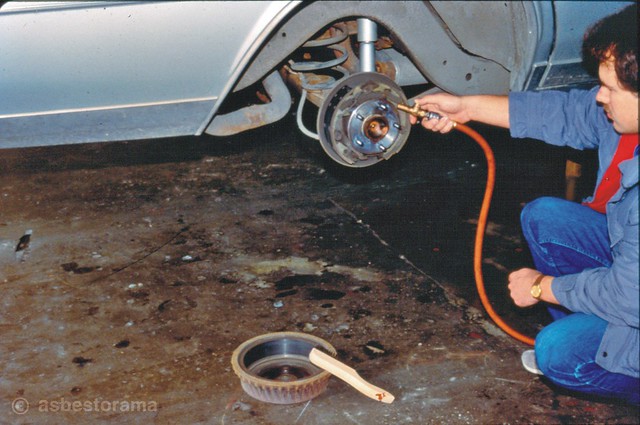Ford Motor Company
The Ford Motor Company is an iconic American company based in Dearborn, Michigan. Ford used asbestos in a variety of automotive products exposing thousands of workers to the toxic mineral. Mechanics who worked with brake and clutch friction materials are at highest risk of past asbestos exposure.

Ford’s History with Asbestos Auto Parts
Since the 1980s, the Ford Motor Company has been named in thousands of lawsuits as a result of asbestos use in its auto parts, including brakes, clutches and gaskets. The company has used asbestos-containing parts in its vehicles since it manufactured its first car in 1903.
Ford was a staunch supporter of the U.S. effort at home to win World War I and World War II. During WWI, the company produced submarine chasers, tanks and cars. In WWII, it made 80% of all U.S. B-24 bomber planes.
Ford remains one of America’s most successful companies. Still, it continues to face mounting lawsuits and defend its past use of asbestos products.
Mechanics Are Most at Risk
Mechanics who installed and worked on Ford friction products, such as clutches and brakes, are most at risk of developing asbestos-related, life-threatening illnesses. Other occupations at risk of asbestos exposure include pipefitters, foundry workers and grinders.
Asbestos products are durable and heat resistant but become dangerous when damaged. They can release toxic fibers into the air. Inhaling these fibers sets the stage for a lengthy latency period before potential development of mesothelioma, other cancers and serious diseases.
Asbestos-containing products sold by Ford include:
- Gaskets
- Brakes pads
- Brake linings
- Clutch facings
- Transmissions
- Engines
Ford sold asbestos auto parts under various brand names, including Ford, Mercury, Ford Authorized Remanufactured and Motorcraft.
Employees and customers who come in contact with these products during production, distribution and installation also are at risk of asbestos-related diseases.

For example, factory workers and warehouse employees come in contact with these products on a daily basis. Employees at auto parts stores and junkyards and consumers who purchase these parts could be exposed to asbestos, too.
Ford began phasing out asbestos brakes and clutches in 1983, when the dangers of the toxic mineral were clear. However, the company continued to use asbestos in Ford Mustangs into the 1990s. Asbestos-containing replacement parts were available until 2001.

Gain access to trust funds, grants and other forms of compensation for you or your loved ones.
Get Help NowNotable Asbestos Lawsuits Against Ford
The majority of lawsuits filed against Ford involve the use of chrysotile asbestos in its brakes and clutches. Experts estimated the brake linings to contain 40% to 60% asbestos fibers.
During brake replacement or repair, the linings are often ground and sanded. This procedure causes asbestos fibers and dust to enter the air, making it easy to swallow or inhale them.
Louisiana Mechanic Awarded $8.2M
In June 2021, a New Orleans jury awarded $8.2 million to Steven Aaron Sr., who filed a lawsuit against Ford Motor claiming he developed mesothelioma from exposure to asbestos repairing Ford vehicles.
Aaron performed thousands of repairs on brakes and clutches working as a gas station and school bus mechanic in the 1960s and 1970s. The jury found Ford Motor negligent in failing to warn auto mechanics about the dangers of asbestos exposure.
Widows of Mechanics Awarded $14M
In a landmark 1996 trial, a Baltimore circuit court jury ordered Ford to pay $8 million to the widow of Keith K. Grewe Sr. and $6.3 million to the widow of Nollie P. Wood Sr. These cases are believed to be the first time Ford was found responsible for brake lining asbestos exposure.
Grewe worked with Ford brakes and genuine replacement parts as a mechanic from 1957 to 1992. He was diagnosed with mesothelioma in 1993 at age 56 and passed away nine months later.
Nollie Wood was exposed to asbestos between from 1948 to 1952, while working near brake and clutch mechanics in the U.S. Post Office Preston Street Garage in Baltimore. Wood was diagnosed with mesothelioma in January 1990 and died four months later.
California Mechanic Awarded $6.8M
On Nov. 19, 2012, a California jury returned a $6.8 million verdict against Ford in favor of Pat and Sharon Scott.
Pat Scott spent his life working on cars, opening his first auto repair shop in 1966. He worked on many Ford cars and trucks as well as his personal Ford vehicles. Scott’s career and hobby working on cars ended in 2011 when he was diagnosed with mesothelioma at age 69.
The jury awarded Scott more than $1.2 million for his medical costs and lost income and $5 million for his pain, suffering and emotional distress. Sharon Scott was awarded $600,000 for her loss of Pat’s support and companionship.
Ford Loses Secondhand Asbestos Exposure Case
Secondhand asbestos exposure occurs when a person comes in contact with the toxic mineral in a nonoccupational setting, such as handling or washing work clothes covered in asbestos dust.
In a 2015 trial, a Tennessee jury found Ford Motor Company 71% liable for Joyce Stockton’s secondhand asbestos exposure, which led to her mesothelioma diagnosis. The lawsuit alleged numerous companies were at fault for Stockton’s contact with asbestos, although Ford was held most liable by the jury. Joyce and her husband, Ronnie Stockton, were awarded $4.6 million.
Ronnie worked with asbestos brakes manufactured by Ford as a mechanic at the garage located on his family’s property. The jury determined Joyce Stockton suffered her exposure to asbestos when she came in contact with her husband’s work clothes.
Ford Escapes $11M Asbestos Verdict
Arthur Juni, a former mechanic who worked on Ford vehicles in the 1970s, filed suit against Ford and others, alleging asbestos exposure from their products caused his mesothelioma. After Juni died in March 2014, his widow, Mary Juni, represented him as the plaintiff.
The trial jury originally awarded $8 million for Arthur Juni’s pain and suffering and another $3 million to Mary Juni for loss of consortium. However, on April 2015, Judge Barbara Jaffe granted a motion to set aside the verdict because of lack of evidence.
On appeal by Ford, the court ruled there was insufficient scientific evidence linking Ford’s products to Juni’s mesothelioma diagnosis, and on Feb. 28, 2017, the New York appeals court upheld Ford’s post-trial disposal of an $11 million jury verdict.
Ford’s Asbestos Exposure Cover-Up
In the face of mounting lawsuits, Ford has spent nearly $40 million to discredit claims that brake mechanics exposed to asbestos are at increased risk of cancer.
According to a 2016 report from The Center for Public Integrity, Ford enlisted the help of consulting firms Exponent and Cardno ChemRisk to author corporate-financed studies on the possible association between brake work and mesothelioma.
The studies resulted in mixed and controversial results. Court records obtained by The Center for Public Integrity show more than 100 doctors, scientists and researchers worldwide have testified asbestos brakes cause mesothelioma.
“[The consulting firms hired by Ford] published a lot, but they’ve really produced no new science,” said John Dement, a professor in Duke University’s division of occupational and environmental medicine and an asbestos researcher for more than four decades.
“Fifteen years ago, I thought the issue of asbestos risk assessment was pretty much defined. All they’ve accomplished is to try to generate doubt where, really, little doubt existed.”
OSHA Asbestos Citations at Buffalo, NY Plant
The Occupational Safety and Health Administration in 2013 fined Ford a total of $41,800 for eight “serious violations” of the regulator’s asbestos and respiratory protection standards.
OSHA officials said a serious violation occurs when “there is substantial probability that death or serious physical harm could result from a hazard about which the employer knew or should have known.”
Officials cited an incident that involved a pipefitter who was exposed to asbestos-containing materials while he was working on a steam pipe.
“Employers should aim at working with their employees to identify, address and eliminate hazards before they occur,” said Robert Kulick, the agency’s regional administrator in New York said in a Ford press release.
Recommended Reading


